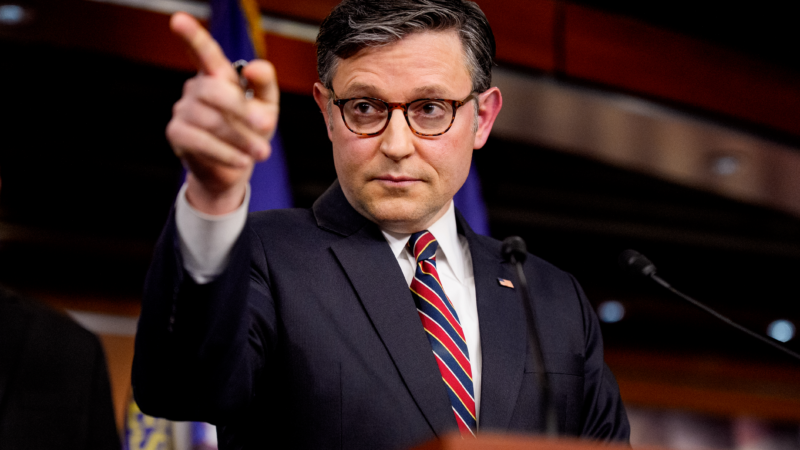House GOP leaders prepare budget vote, daring dissenters to oppose Trump
House Republican leaders are pushing forward Wednesday with a vote on a budget framework meant to advance much of President Trump’s domestic agenda, despite opposition that threatens to derail the bill.
Fiscal hawks within the House GOP raised alarm over limited cuts to the federal deficit and other issues in the Senate-passed plan, which left the fate of the bill unclear. But Trump ramped up pressure to pass the bill on Tuesday, triggering House Republican leaders to roll the dice on a framework for the multi-trillion plan of new tax, immigration, defense and energy policy.
“Just in case there are a couple of Republicans [not] there: you just gotta get there, close your eyes and get there,” Trump urged at a National Republican Congressional Committee dinner on Tuesday night. “It’s a phenomenal bill. Stop grandstanding. Just stop grandstanding!”
Republicans are working toward a plan that they hope will become a hallmark of Trump’s second term, including a tax overhaul, a flurry of new policies revamping immigration and other top GOP priorities. First, House and Senate Republicans need to pass identical versions of a budget resolution to get access to reconciliation, a feature of the budget process that bypasses a Senate filibuster tied to Democratic opposition.
House Speaker Mike Johnson, R-La., can only afford to lose three votes for the bill to pass. So far, two hard-line conservatives— South Carolina Rep. Ralph Norman and Texas Rep. Chip Roy— already announced in the rules committee they would vote against the measure on the floor.
During a House Rules Committee meeting Wednesday morning, top panel Democratic Rep. Jim McGovern, D-Mass., quoted several House Republicans publicly trashing the Senate plan. He argued he’d add more orders to Trump’s demand to vote for the blueprint anyways.
“Close your ears, cover your ears and hide your calculators,” McGovern said. “He wants all of you guys to close your eyes and kiss his ass.”
House and Senate Republicans remain trillions of dollars apart in expectations of how much should be cut from the federal budget in this process, triggering an intense intraparty divide.
The Senate plan, which was passed early Saturday after a late night session, directs only about $4 billion in the federal deficit cuts. That falls dramatically short of minimum $1.5 trillion reductions in the House version.
The divide put House Budget Committee Chair Jodey Arrington, R-Texas, in an awkward position, seemingly testifying for and against the plan in a House Rules Committee hearing on the framework.
“It’s critical that the reconciliation bill be guided by the House’s resolution framework, otherwise we do risk adding trillions of dollars to the national debt,” he told the panel.
House Rules Committee Chair Virginia Foxx, R-N.C., called the naysaying “scare tactics.”
Tariff messaging also on the line
House Republicans also added a provision to a necessary procedural step that would essentially ban any vote to roll back Trump’s tariffs for the next six months. The language was included in the measure setting rules for debating the legislation. That measure must pass before the House can move ahead with the underlying budget bill.
Democrats attempted to remove the provision in committee but were voted down.
The decision to add the tariff language to the rule fueled Democrats’ attacks on GOP members backing the bill. Top Democrats vowed to hammer swing district Republicans in the midterms for going on the record backing Trump’s economic policies.
CJ Warnke, Communications Director of the House Democrats’ Super PAC, known as House Majority PAC or HMP, confirmed the plan in a written statement to NPR.
“House Republicans will today vote to tank the economy, destroy retirement savings, lay off workers, and raise prices,” Warnke wrote. “HMP thanks them for writing our ads for us.”
Republicans still hope to move ahead
Republicans are hoping to bridge the divide by highlighting the areas where they do agree. Both plans would raise the U.S. debt limit by $5 trillion, which would avert a potentially catastrophic default this summer.
Senate and House Republicans also direct similar levels of new funding to a range of GOP policy priorities, including U.S. border enforcement, immigration initiatives and defense spending.
Republicans also agree they’d like to extend the Tax Cuts and Jobs Act passed in 2017 under Trump’s first term. However, the cost of extending those cuts is closely tied to fiscal hawks’ concerns. The independent, non-partisan tax analysis arm of Congress, Joint Committee on Taxation, has estimated extending the cuts could cost more than $4 trillion. But there is a significant dispute among Republicans about that cost and how to account for it in the policy writing process.
The tax cuts are set to expire by year end, which Republicans argue would mean a tax hike for millions of Americans.
NPR Congressional Correspondent Deirdre Walsh contributed to this report.
Dozens presumed dead in fire at Swiss Alps bar during New Year’s celebration
Dozens of people are presumed dead and about 100 injured, most of them seriously, following a fire at a Swiss Alps bar during a New Year's celebration, police said Thursday.
Warren Buffett officially retires as Berkshire Hathway’s CEO
The legendary 95-year-old investor spent decades building his company into one of the world's largest and most powerful. Now Greg Abel is taking it over.
Crypto soared in 2025 — and then crashed. Now what?
For most of 2025, cryptocurrencies such as bitcoin surged as President Trump vowed to make the U.S. a crypto leader. But now, a severe sell-off has shaken the sector.
Zohran Mamdani sworn in as New York City mayor, capping historic rise
Mayor Zohran Mamdani took the oath of office in New York City after midnight Thursday. The city's first Muslim mayor, a member of the Democratic Socialists of America, has promised to focus on affordability and fairness.
Rising from the ashes, a symbol of hope at the Rose Parade
Survivors of the Eaton and Palisades Fires find healing and community working on a Rose Parade float to honor the lives and communities lost in last year's wildfires.
The history behind the NYC subway station chosen for Mamdani’s swearing-in
The city shut down the station in 1945 on New Year's Eve. Eighty years later, it's a symbolic venue choice for the incoming mayor's private swearing-in ceremony.







